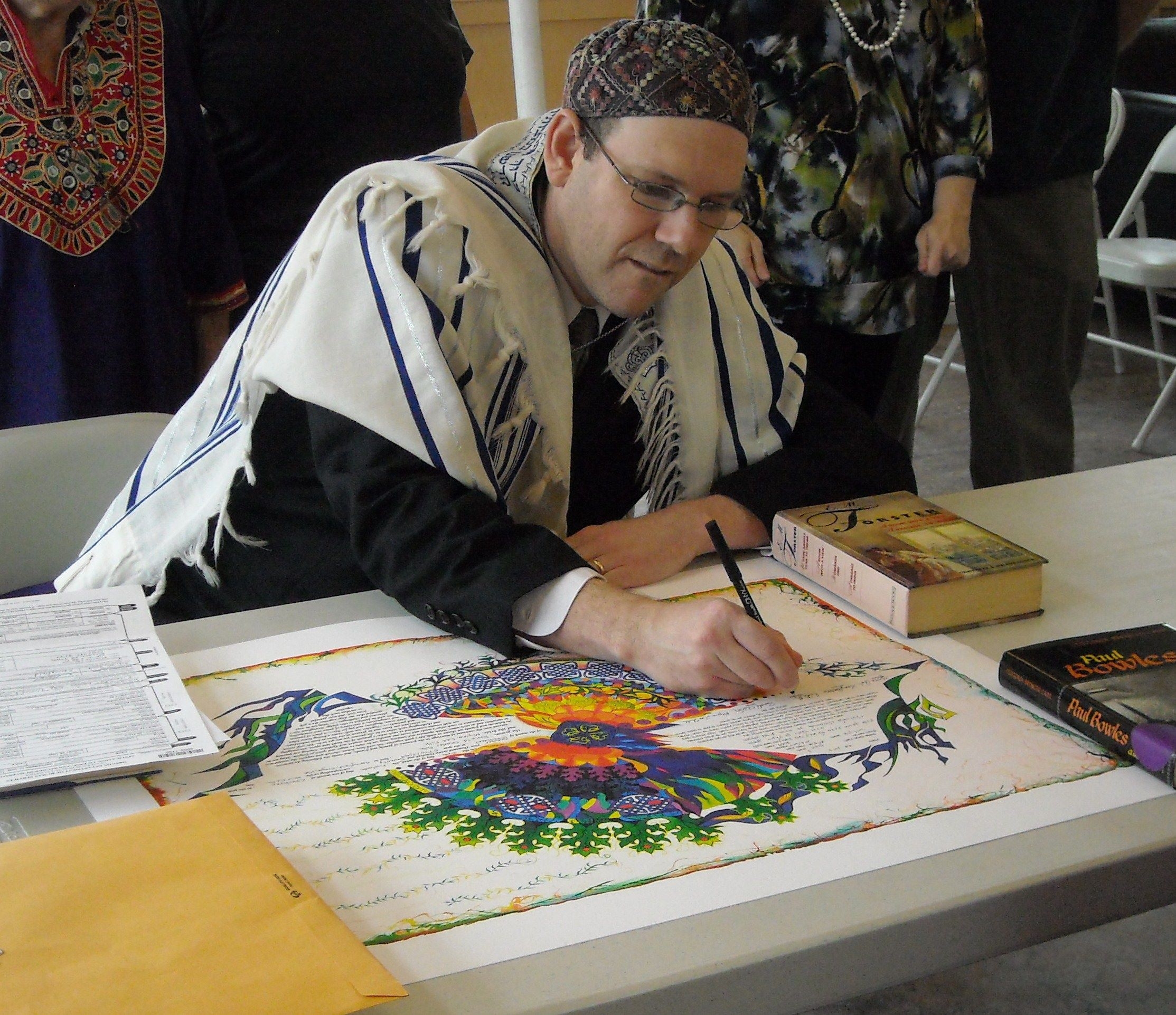I wrote this ritual for a person was just recently released from the hospital after their first hospitalization/episode. I imagine the best time for this ritual is when the person is stable and is able to ask for, process, and benefit from a ritual. I have also imagined this ritual as taking place in the person’s home because they would like to keep the ritual and diagnosis private. Although the person in this ritual has elected not to involve family at this point the ritual can be adapted to include supportive family and friends.
Rabbi or person leading the ritual says:
Ploni/Plonit [person’s name], we are meeting today to ritualize your recent diagnosis. You have shared with me that it has been a struggle, one which has been challenging, draining, and tremendously sad. I want to highlight and acknowledge that you have always sought help and support, which is difficult but so healthy and important. We come here today to acknowledge your journey thus far and to establish a healthy intent (kavannah) going forward.
Throughout your hospitalization you sought and, at times, found G-d’s presence, specifically when lying in bed. During one of our visits you shared with me that Psalm 6 was particularly comforting for you to read throughout your hospitalization. Let us be grateful for that comfort by reading together Psalm 6:
Rabbi and Ploni/t recite together:
2 O LORD, rebuke me not in Thine anger, neither chasten me in Thy wrath.
3 Be gracious unto me, O LORD, for I languish away; heal me, O LORD, for my bones are affrighted.
4 My soul also is sore affrighted; and Thou, O LORD, how long?
5 Return, O LORD, deliver my soul; save me for Thy mercy’s sake.
6 For in death there is no remembrance of Thee; in the nether-world who will give Thee thanks?
7 I am weary with my groaning; every night make I my bed to swim; I melt away my couch with my tears.
8 Mine eye is dimmed because of vexation; it waxeth old because of all mine adversaries.
9 Depart from me, all ye workers of iniquity; for the LORD hath heard the voice of my weeping.
10 The LORD hath heard my supplication; the LORD receiveth my prayer.
11 All mine enemies shall be ashamed and sore affrighted; they shall turn back, they shall be ashamed suddenly.
Rabbi says:
As we look toward the future and your continued stability, the only thing known about this journey is that it is unknown. The unknown is scary and frustrating. We have spoken at length about the anxiety that comes with not knowing. The serenity prayer can be helpful in that it affirms that the only thing we know about the future is that it is unknown, but within the unknown there are places to center oneself and places for change if we cultivate the knowledge to identify these places.
Ploni/t I’d like you to read the serenity prayer while I focus on a kavannah for you. My kavannah for you is that you will find the wisdom inherently within you to handle whatever comes your way to the best of your ability with the support and resources you have available to you.
G-d, grant me the serenity to accept the things I cannot change,
Courage to change the things I can,
And wisdom to know the difference.
Rabbi says:
You are not alone. Your family has and continues to be a support to you; you and I have worked together throughout your hospitalization. My blessing for you today is that in times of distress and challenge you remember all the people who are here to support and love you. You asked that we take some time to reflect on all the support you have received throughout this part of your journey. In the depths of your despair it is challenging for you to remember all the love and support that surround you. Therefore I asked you to write down memories of love and support in a book so that you may carry these reminders with you when you are in dark moments; this book and these memories serve to remind you of the love and support which continues to surround you.
Ploni/t and Rabbi share memories with one another.
Rabbi says:
You are just beginning this journey with your recent diagnosis. This journey will not be an easy one. Many times you will need great strength. I would like to give you this prayer written by Rabbi Elliot Kukla in the hopes it will give you strength and support today and in the future. It is based on the ancient Mi Sheberach healing prayer which has soothed and supported our people for centuries; I hope it brings the same to you.
A Prayer of Healing for Mental Illness
May the One who blessed our ancestors bless all who live with mental illness, our care-givers, families, and friends. May we walk in the footsteps of Jacob, King Saul, Miriam, Hannah, and Naomi who struggled with dark moods, hopelessness, isolation, and terrors, but survived and led our people. Just as our father, Jacob, spent the night wrestling with an angel and prevailed, may all who live with mental illness be granted the endurance to wrestle with pain and prevail night upon night. Grace us with the faith to know that though, like Jacob, we may be wounded, shaped and renamed by this struggle, still we will live on to continue an ever unfolding, unpredictable path toward healing. May we not be alone on this path but accompanied by our families, friends, care-givers, ancestors, and the Divine presence. Surround us with loving-kindness, grace and companionship and spread over us a sukkat shalom, a shelter of peace and wholeness. And let us say: Amen.
© Rabbi Elliot Kukla, Bay Area Jewish Healing Center, 2010
Rabbi says:
Let us conclude by sitting in silence for a few minutes, reflecting on this ritual.
Ploni/t and Rabbi sit in silence for a few minutes.
Rabbi says:
Ploni/t, I bless you today with the capacity to know when you must seek help and support. I hope you are able to use some of the prayers we read today in times when you need strength. May you continue to find comfort in these prayers and turn to them in times of need. I have been truly privileged in walking with you as you have begun this journey. I hope that you will continue to invite me along the way so that I can continue to support you. You are a strong person with a good heart and I am blessed to know you.











